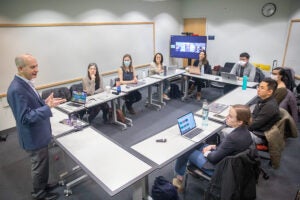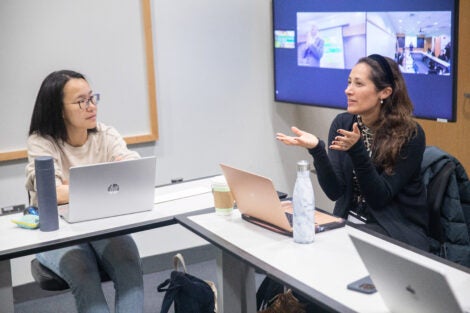February 1, 2023—Registered nurse Brynn Macaulay, MPH ’25, used to be reluctant to bring up nutrition with the high-risk pregnant patients she serves. She works at a safety net hospital, and thought it seemed inappropriate to tell people whose food budgets are much tighter than her own what they should be eating. But she’d seen the toll that diet-controllable diseases can have on pregnant people’s health and wanted to do more to help.
So, Macaulay, a student at Harvard T.H. Chan School of Public Health, enrolled in a new course offered during January WinterSession called “Integrating Nutrition into Clinical Medicine: The Role of Health Professionals as Change Agents.” Instructor Stephen Devries, adjunct associate professor, preventive cardiologist, and executive director of the nonprofit Gaples Institute offered tools for fitting nutrition counseling into busy patient visits. Macaulay appreciated that they included making healthy eating accessible to people of all income levels.
Just a few days into the one-week course, she’d already put what she’d learned into action. While providing care to an expectant mother with type 2 diabetes, Macaulay brought up using dietary changes to control her condition. When she came back to check on her patient, the woman was doing research on her phone, compiling a list of food substitutions. “She was really annoyed to be back in the hospital,” Macaulay said, “so I think it was empowering for her to have this new understanding of control.”
Filling a gap in medical education
The course grew out of discussions by the School’s Nutrition Education Working Group, which is led by Devries and Walter Willett, professor of epidemiology and nutrition. In addition to the course, the group’s advocacy has contributed to strengthened nutrition content in medical board exams and to a U.S. House Resolution, co-authored by Congressman James McGovern (D-MA) and passed in 2022, that calls for medical schools and training programs to improve nutrition education.
“Many medical schools have virtually no human nutrition. They sometimes say they’re teaching nutrition, but it’s biochemistry. That doesn’t really help a physician interact with their patients around guiding them toward a healthier diet,” said Willett. Given the harm caused by diet-controllable diseases, it’s crucial that physicians understand what patients are eating before they develop serious conditions, he said.
Through its work, the group is developing new models for bringing nutrition education and practice to clinical settings, Devries said.

The course included eight Harvard Chan School and Harvard Medical School students with varied backgrounds in nutrition. To ensure that everyone was up to speed on fundamentals, students completed a series of online nutrition modules as homework throughout the week. These were developed by Devries’ Gaples Institute and are now part of the required curriculum in six U.S. medical schools.
Much of the classroom time was focused on practical strategies for integrating nutrition into clinical care. For example, during one session, Devries outlined obstacles providers face, such as Medicare coverage limits and time-crunched appointments. But even with these constraints, he said, providers can still take actions such as conducting a rapid dietary assessment and picking one feasible and actionable area for a patient to try to change.
Guest speakers during the course included Harvard Chan School faculty members Willett, Howard Koh, David Eisenberg, who directs the Teaching Kitchen Collaborative, and Helen Delichatsios.
At the end of the week, students presented their work on two final projects: a personal nutrition intervention that they implemented during the course and a system-wide intervention that they could launch in a real-world setting.
The students embraced their personal nutrition challenges—such as cooking healthy meals at home or giving up afternoon coffee—and reported experiencing positive results even after just a few days. This benefits the students’ health as well as the patients they hope to serve, Devries said. “When health professionals make healthier lifestyle changes, then they’re much more likely to counsel their patients to do likewise.”
The systemic interventions students presented included setting up a food bank for families of children being cared for in a pediatric oncology program, and providing dietician referrals for patients who come to the emergency room with acute exacerbations of diet-related chronic illnesses.
Zezhou (Zach) Zhao, MD-PhD ’28, focused his final project on improving dietary diversity in hospital kitchens. Originally from China, he sympathized with Chinese patients he’s cared for in the U.S. who have struggled to adapt to unfamiliar food. “It’s hard to be in a vulnerable place and eating food that isn’t what they want,” he said. “That really impacts their health experience and potentially can lead to adverse health outcomes, further exacerbating the health care disparities experienced by minority and immigrant populations.”
Zhao said the course left him feeling better equipped to integrate nutrition into his clinical practice. “I realized that you don’t have to change everything [about a patient’s diet] all at once,” he said. “Be confident, be empowering, choose one action item with a patient each time. I am sure that can make a difference.”
Photos: Kris Snibbe/Harvard University
